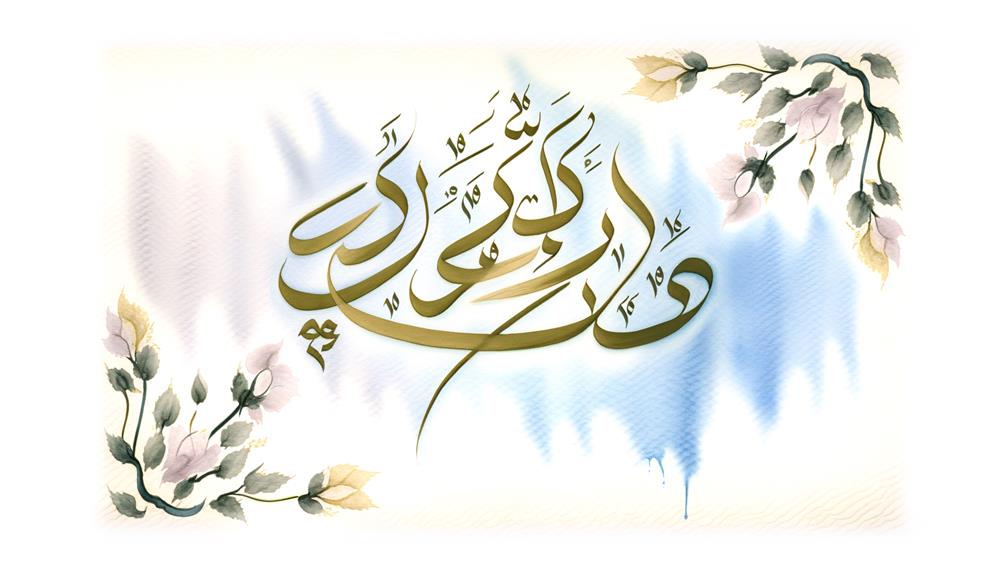Ajmal Name Meaning in English
The name 'Ajmal' originates from the Arabic root 'J-M-L,' signifying 'most beautiful.' This superlative form reflects both physical and moral beauty. Historically, 'Ajmal' featured prominently in classical Arabic poetry, symbolizing ideals of virtue and aesthetic excellence.
Its cultural significance extends into modern times, influencing artistic, literary, and social domains. The name remains popular, particularly in regions with strong Islamic heritage, due to its enduring association with beauty and integrity.
Notable figures bearing the name have enhanced its prominence across various fields. Discovering its multifaceted cultural and historical impact reveals more about its lasting appeal.

Key Takeaways
- Ajmal is derived from the Arabic root word 'J-M-L' meaning beauty.
- The name signifies 'most beautiful' in its superlative form.
- It symbolizes ideals of beauty, virtue, and moral excellence.
- Ajmal has historical significance in classical Arabic poetry and literature.
- The name is popular in regions with strong Islamic heritage.
Etymology of Ajmal
The name 'Ajmal' finds its etymological roots in the Arabic language, where it is derived from the root word 'J-M-L,' which signifies beauty and attractiveness. This lexical origin highlights a cultural emphasis on aesthetic values and the appreciation of physical and moral beauty within Arabic-speaking communities.
Linguistically, 'Ajmal' operates as a superlative form, implying 'most beautiful' or 'more beautiful,' accentuating its positive connotations. The morphological structure of the name underscores its adaptability across various contexts, ranging from personal names to poetic expressions.
Analyzing the semantics of 'Ajmal' elucidates a deeper understanding of the cultural and linguistic frameworks that valorize the concept of beauty, enriching one's appreciation of the name's profound significance.
Historical Significance
Ajmal's historical significance can be traced back to its frequent use in classical Arabic poetry and literature, where it symbolized ideals of beauty and virtue. This name often appeared in the works of revered poets who used it to embody their aesthetic and moral values.
The term 'Ajmal' was not merely a descriptor but a profound expression of the cultural appreciation for physical and moral excellence. Historical texts reveal that the name was also associated with prominent figures in various fields, further solidifying its esteemed status.
The recurrent use of Ajmal in literary and historical records underscores its importance and enduring legacy in the context of Arab cultural and intellectual traditions.
Cultural Impact
Reflecting its profound historical significance, the name Ajmal exerts a significant cultural impact across various domains of contemporary Arab society. Its etymological roots, meaning 'most beautiful' or 'excellent,' resonate deeply within artistic, literary, and social contexts.
In literature, the name often symbolizes ideal beauty and moral integrity, enhancing its appeal and usage in poetic and narrative forms. Socially, Ajmal is a favored choice for newborns, reflecting parents' aspirations for their children's virtue and charm.
Additionally, the name's prevalence in business, particularly in the fragrance and fashion industries, underscores its association with quality and elegance. Consequently, Ajmal's cultural impact is multifaceted, permeating various levels of societal interaction and cultural expression in the Arab world.
Popularity Over Time
Observing the name Ajmal's journey through history reveals its enduring popularity and evolving significance across different eras. Historical records indicate that Ajmal has consistently been a favored choice within various cultures, particularly in Arabic-speaking regions. The name's etymological roots, denoting beauty and excellence, have contributed to its sustained appeal.
Demographic studies show fluctuations in its use, often correlating with sociopolitical and cultural trends. In contemporary times, the name maintains its relevance, reflecting a blend of traditional values and modern adaptability. Statistical analyses further highlight its prevalence in regions undergoing cultural renaissance or retaining strong ties to Islamic heritage.
Famous Namesakes
Prominent individuals bearing the name Ajmal have made significant contributions across various fields, thereby enhancing the name's distinguished legacy.
For instance, Ajmal Kasab, although notorious, brought global attention to issues of terrorism and security.
Conversely, Ajmal Khan, an eminent physician and freedom fighter in India, left an indelible mark on both medical science and the Indian independence movement.
Ajmal Shahzad, an English cricketer, has made notable strides in sports, demonstrating versatility and skill.
Additionally, Ajmal Perfumes, an internationally renowned perfume brand, was founded by Haji Ajmal Ali, further illustrating the entrepreneurial spirit associated with the name.
These individuals, through their diverse achievements, underscore the multifaceted impact of the name Ajmal on global history and culture.
Variations and Pronunciations
The name Ajmal, while maintaining its core meaning of 'most beautiful' or 'handsome,' exhibits several variations and pronunciations across different cultures and languages.
In Arabic, it is typically pronounced as 'Ahj-mal,' with emphasis on the first syllable. In South Asian contexts, specifically Urdu and Hindi, it maintains a similar pronunciation but may slightly vary in accent. Additionally, transliteration into Latin alphabets can lead to minor phonetic deviations.
Variants such as 'Ajmel' or 'Ajamal' may arise, though less common. Despite these differences, the name consistently retains its inherent aesthetic and cultural significance.
Understanding these variations underscores the name's adaptability and widespread appeal across diverse linguistic backgrounds.
Symbolic Meanings
Rooted in its etymological origins, the name Ajmal conveys profound symbolic meanings that extend beyond its literal definition of physical beauty. In a broader context, Ajmal represents the embodiment of inner beauty, moral integrity, and spiritual purity.
The name encapsulates ideals of virtue, suggesting a person who not only possesses outward attractiveness but also an admirable character and ethical fortitude. Additionally, Ajmal signifies a harmonizing presence, fostering peace and goodwill within interpersonal relationships.
Conclusion
The name 'Ajmal,' rooted in Arabic etymology, translates to 'most beautiful' in English, and carries significant cultural and historical weight.
One interesting statistic is its surge in popularity within the Muslim community, where it ranks among the top 100 baby names in several Middle Eastern countries. This reflects not only its aesthetic appeal but also its deep cultural resonance.
Variations in pronunciation and symbolic meanings further enrich its global and linguistic diversity.






